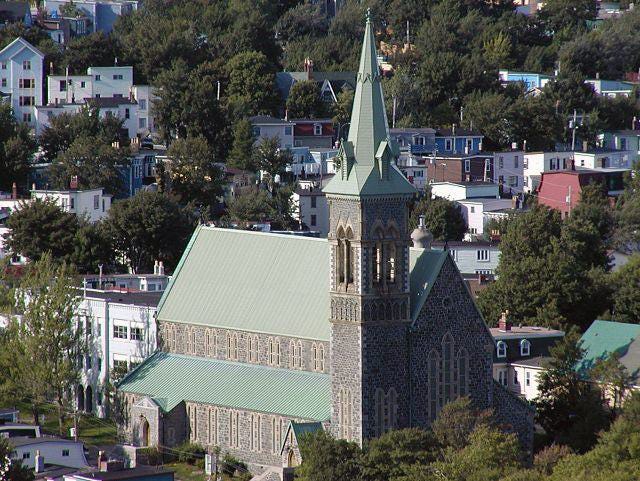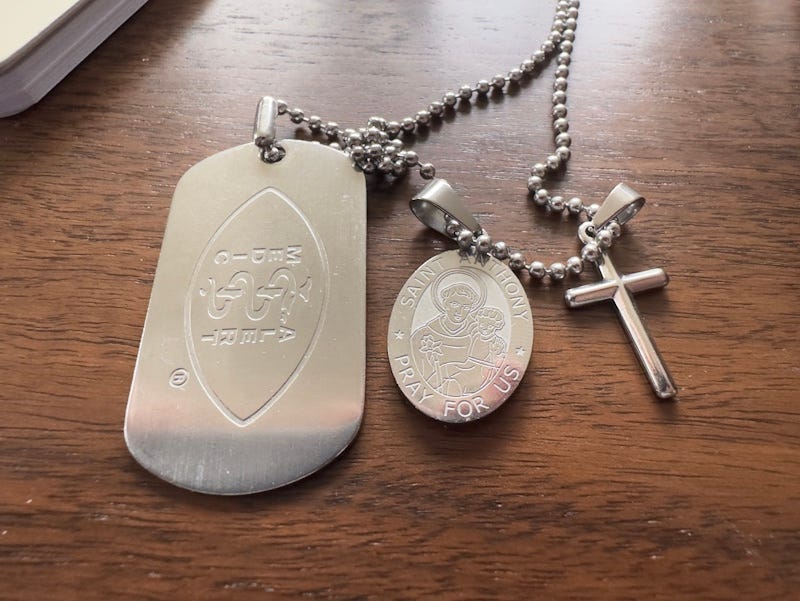A Former Anglican's Latent Catholicism
Edit: June 21, 2025 I originally wrote this earlier in 2025, ahead of the calling of the new Pope. Given the long history of the Catholic Church, that event is always significant and I watched it with interest. We also recently watched the film “Conclave” which was really well done. Hopefully this new Pope can do more to work for peace, equality, fair treatment for all, and justice for the many victims of abuse at the hands of church’s leaders.
I still remember when Pope John Paul II visited Newfoundland back in the 1980s. The city worked hard to clean up the route he would take they drove through the city to the spot where he would speak to the people. My brother Kevin was in the Canadian Forces Militia back then, which you’d call the Reserves now. He had a job to help with security and stood with an unloaded rifle (maybe an FN?) the whole time. He had ammo in his pouches, just in case it was needed. He said he never saw the Pope, as he was always facing the crowd. He said there was no trouble, except for the local kids mouthing off at him and throwing rocks.
My mother was born into the Anglican faith, and my father’s family was Catholic. When I was a child, they converted to The Church of Jesus Christ of Latter-day Saints (or the LDS Church). Before this, I was baptized Catholic as a baby at St. Patrick’s church in St. John’s, Newfoundland and Labrador. My God Parents for this was my Uncle Wayne and Aunt Jeanine. That church, like many others, is being sold off to help pay compensation for the victim’s of abuse at the hands of the Catholic church.
My mom stayed true to her Christian LDS beliefs. My father, however, drifted away around the time my mother kicked him out. We weren’t very close, so I’m not sure where he landed in the end. Hopefully he has it figured out by now.
Growing up in Newfoundland and Labrador, most everyone was either Catholic or one of the Protestant religions. Our society was incredibly homogenous, but that has fortunately evolved over the years. Our public schools were all religious-based, with the two main school boards being the Catholic one and the “Amalgamated” one that was the Protestant churches lumped together and for anyone else not served by their own faith’s schools.
I attended Protestant schools, but my older siblings started with the public Catholic schools. The Catholic schools tended to have epic names like “Mary Queen of the World” and “Holy Heart of Mary”, with the buildings filled with Catholic iconography and traditions. The Protestant schools did not have this and were much like any other public school you would see now, including bland names like that of my elementary school, “Newtown Elementary”.
Religion class was one of the standard subjects growing up and each school would have a religious leader assigned to it on rotation. These ministers would host religious-themed school assemblies on various holidays and celebrations. As an LDS kid, I did not always fit in, but I enjoyed religion class and learning about other religions. We said the Lord’s prayer before class started, and everyone got a Gideon’s New Testament Bible in sixth grade.
This school experience was all very mild and was a stark contrast with the horrific brutality that was happening nearby at Catholic residential schools and even the regular beatings my father received at my age at his school. Non-Christians, a tiny minority, were often mistreated and openly bullied at my school.
For many people, despite all this, religion was oftentimes more of a cultural thing and not something to be actively practiced. The church was there for you when you were born, got married, and when you died. You were Catholic out of tradition, and there was a background of tension between the Catholics and the Protestants. Once, in my first-grade class, a rusty bolt smashed through the window, and my teacher quickly cursed out and blamed the kids from the nearby Holy Cross school. In some communities, the Orangemen did their annual march, and Irish musicians came for concerts to raise money for the IRA.
Meanwhile, at home in my family, the various religious traditions were blended and integrated into our daily lives. We celebrated Shrove Tuesday, also known as Pancake Tuesday, each year. My mom would make her very heavy pancakes, which were more like toutons or fry bread. Mom would boil coins in water to clean them and put them into the pancakes, which was the tradition for that day. We’d eat these pancakes with molasses or jam as we could not afford expensive maple syrup. Pancake Tuesday was always appreciated, and we would get excited as the day approached.
My great-grandmother, Dorcus Diack, was an active Salvation Army member, another religion we greatly respected. Nowadays, few people realize it is a church and only think of it as a charitable organization. That is a good thing and something more religions should strive to emulate. Dorcus could be strict in her beliefs, and this filtered down into our family. An example of this was that we could not have playing cards in the house, as card games were said to lead to idleness and gambling. “Idle hands are the Devil’s workshop”, which is from the Bible and was the justification for this.
For all these religious influences, one that has endured the test of time for us was seeking the help of the Catholic Saint Anthony. St. Anthony was a 13th-century Franciscan friar from Portugal and is known as the patron saint of lost or stolen things. Whenever we could not find something, my mom would quickly ask us if we prayed to St. Anthony for help. To this day, we all do this and have passed this on to the next generation. After my mom passed away, I started wearing a small St. Anthony medal alongside my medical information necklace. It helps me remember my dear mom, and I touch it when I have lost something, including the loss I feel from her passing.
I was taught early on that religious beliefs are meant to lift you up and encourage you to help those around you. This continues to be my litmus test for many things - uplifting messages are worth my time and attention. Adopting the positivity from other religions or beliefs is another way to do this.
One of the former leaders of my church, Gordon Hinckley said, “To anybody who is not of this Church, I say we recognize all of the virtues and the good that you have. Bring it with you and see if we might add to it.”
With all that in mind, I continue to be a Christian LDS believer who is a little Catholic, Anglican, Hindu, Buddhist, and someone who appreciates the examples of the beliefs of my dear friends and others.



Awesome 😎 Shane! Thank you for sharing!